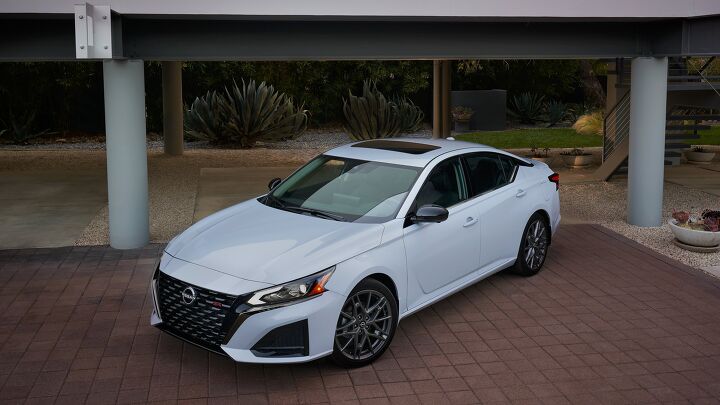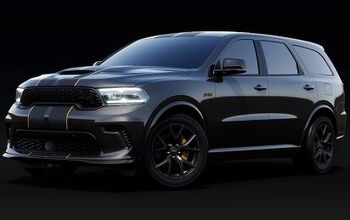Nissan Rental Sales: The Altima Might Remain the Fastest Car on the Road

If you’ve rented a car in recent years, there’s a great chance you were offered a Nissan of some sort. Whether it’s the Altima or Rogue, Nissan has long relied heavily on fleet sales, and the company’s most recent sales numbers show that the habit hasn’t died yet. A whopping 44 percent of its February 2024 sales, or around 40,000 vehicles, went to fleets, so get ready to be a temporary Nissan driver the next time you rent a car.
While surprising, the 44 percent number isn’t entirely out of line with Nissan’s sales through 2023, where around a quarter of its sales came from fleets during the first 11 months. That’s terrible news for its dealers, half of which are unprofitable, according to a source talking to Automotive News.
Though those numbers don’t look great for Nissan, its leader of U.S. sales, Judy Wheeler, said that the sales were due to a glut of Rogue crossovers and blamed consumers’ quicker-than-expected shift toward hybrids. The fleet sales help take some pressure off dealers to move a ton of excess inventory. The 2024 Rogue and Sentra were also delayed, so some of February’s sales should have taken place last year.
The company said it expects rental fleet sales to stabilize and noted that it would come within a point or two of its 15 percent target. Even so, it has already faced difficulties with fleet sales, as before the pandemic, it said the practice had damaged vehicle residual values and driven its dealers toward unprofitability.
Wherever the fleet sales number lands for 2024, it’s clear Nissan has work to do. A dealer told Automotive News that the brand is moving a fraction of the number of vehicles that rivals Toyota and Honda do, and it has the most days of inventory of any full-line automaker in January.
[Image: Nissan]
Become a TTAC insider. Get the latest news, features, TTAC takes, and everything else that gets to the truth about cars first by subscribing to our newsletter.

Chris grew up in, under, and around cars, but took the long way around to becoming an automotive writer. After a career in technology consulting and a trip through business school, Chris began writing about the automotive industry as a way to reconnect with his passion and get behind the wheel of a new car every week. He focuses on taking complex industry stories and making them digestible by any reader. Just don’t expect him to stay away from high-mileage Porsches.
More by Chris Teague
Latest Car Reviews
Read moreLatest Product Reviews
Read moreRecent Comments
- Olivehead The Honda Civic wins on looks and interior material quality and style. The Civic looks like a scaled down "real" car (i.e., midsize) while the Corolla never lets you forget what it is-a compact car, harkening back to the Tercel, etc. No comparision either in the interior materials of the Civic (a notch below Acura level) and general layout. There too, the Corolla comes off as a compact runabout. The Civic hatchback is especially cool.
- Mike Beranek While the product may appear to be "better", only time will tell. The American automotive environment can chew a car up and spit it out. Will these Chinese EVs survive like a quarter-century old Cavalier, or will they turn out like VinFast's "cars"?
- Mike Beranek This police vehicle will be perfect for when the State of Florida starts tracking every pregnancy.
- Dave M. The Highlander hybrid, a larger, heavier vehicle, gets better mpgs. Why? Also, missed opportunity - if Toyota had made this a hatchback, they could have scooped up the "want a Tesla S but not ready for a full EV" crowd, however small or large they may be....
- TheMrFreeze Difficult call...the more the mainstream automakers discontinue their more affordable models and only sell crazy overpriced EVs and trucks, the more appealing the idea of letting in cheap imported cars becomes with the buying public. If the government is going to impose tariffs on Chinese vehicles, at the same time they need to be getting with the Big 3 and telling them to fill the void with affordable models and not use the tariff as an excuse to simply raise prices. Otherwise, public pressure could see the tariffs withdrawn.I seem to recall the last administration put a 25% tariff on Chinese steel, at which point the US manufacturers immediately used the opportunity to raise their prices 25%...that needs to not happen.

































Comments
Join the conversation
"The company said it expects rental fleet sales to stabilize and noted that it would come within a point or two of its 15 percent target. Even so, it has already faced difficulties with fleet sales, as before the pandemic, it said the practice had damaged vehicle residual values and driven its dealers toward unprofitability."
Before this 44 percent number, Nissan was running about 25 percent fleet sales, way above their 15 percent target level. Cars are sold to rental fleets at a discount (less revenue for Nissan). Also, rental companies sell cars after 6-8 months, or before 30,000 miles, resulting in a huge dump of used cars on the market, which depresses residual values for other Nissans - a double whammy.
Nissan reported making only $800 profit per new vehicle sold in 2023, the lowest of all the major automakers. As Peter De Lorenzo would say, a mile-long freight train of Not Good.
Big mistake. Daily rental fleet sales are the fastest path to brand devaluation and lower resale and residual values. Without any incentives, you can lease a superior Accord or Camry for less than an Altima simply because the residual value of the Nissan is so much lower than the Toyota or Honda. When these fleet cars come out of service and hit the auctions in big numbers, Altima values will drop even faster as there will be a huge glut on the market. This same thing happened after the 2008-2010 recession, automakers dumped excess production capacity into fleets and a year later you could buy a Chevy Malibu or Ford Taurus for 50% off MSRP with less than 20k miles. Nissan really needs to invest in improving their product to sell at retail and adjusting production to meet actual demand. Otherwise they'll be the next Mitsubishi.